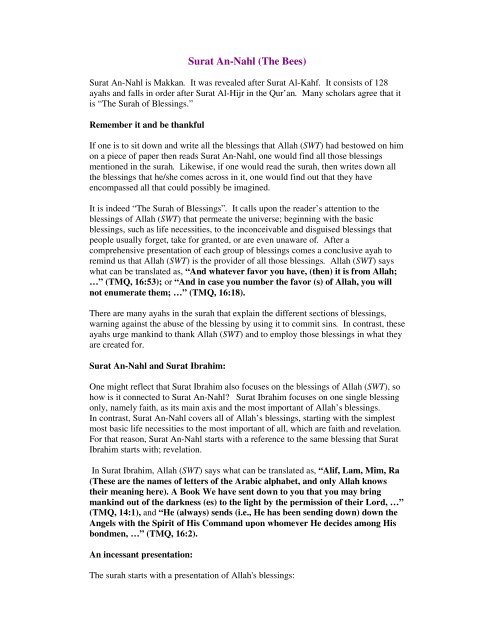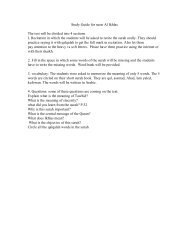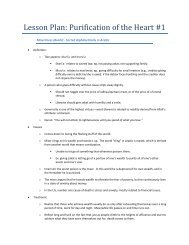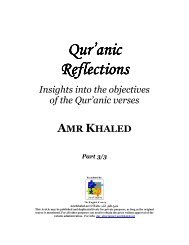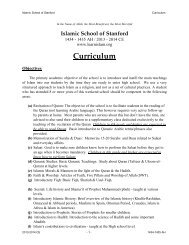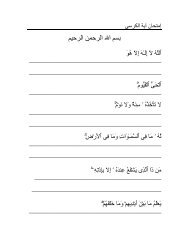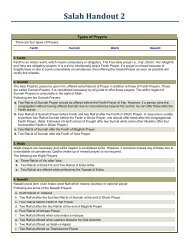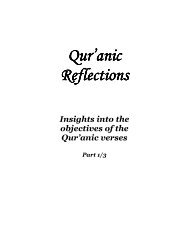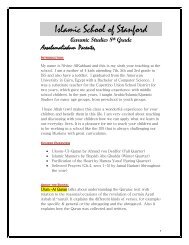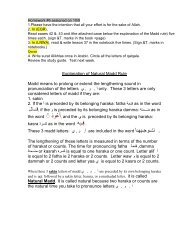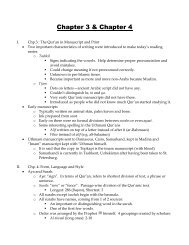Quranic Reflections - Islamic School of Stanford
Quranic Reflections - Islamic School of Stanford
Quranic Reflections - Islamic School of Stanford
You also want an ePaper? Increase the reach of your titles
YUMPU automatically turns print PDFs into web optimized ePapers that Google loves.
Surat An-Nahl (The Bees)<br />
Surat An-Nahl is Makkan. It was revealed after Surat Al-Kahf. It consists <strong>of</strong> 128<br />
ayahs and falls in order after Surat Al-Hijr in the Qur’an. Many scholars agree that it<br />
is “The Surah <strong>of</strong> Blessings.”<br />
Remember it and be thankful<br />
If one is to sit down and write all the blessings that Allah (SWT) had bestowed on him<br />
on a piece <strong>of</strong> paper then reads Surat An-Nahl, one would find all those blessings<br />
mentioned in the surah. Likewise, if one would read the surah, then writes down all<br />
the blessings that he/she comes across in it, one would find out that they have<br />
encompassed all that could possibly be imagined.<br />
It is indeed “The Surah <strong>of</strong> Blessings”. It calls upon the reader’s attention to the<br />
blessings <strong>of</strong> Allah (SWT) that permeate the universe; beginning with the basic<br />
blessings, such as life necessities, to the inconceivable and disguised blessings that<br />
people usually forget, take for granted, or are even unaware <strong>of</strong>. After a<br />
comprehensive presentation <strong>of</strong> each group <strong>of</strong> blessings comes a conclusive ayah to<br />
remind us that Allah (SWT) is the provider <strong>of</strong> all those blessings. Allah (SWT) says<br />
what can be translated as, “And whatever favor you have, (then) it is from Allah;<br />
…” (TMQ, 16:53); or “And in case you number the favor (s) <strong>of</strong> Allah, you will<br />
not enumerate them; …” (TMQ, 16:18).<br />
There are many ayahs in the surah that explain the different sections <strong>of</strong> blessings,<br />
warning against the abuse <strong>of</strong> the blessing by using it to commit sins. In contrast, these<br />
ayahs urge mankind to thank Allah (SWT) and to employ those blessings in what they<br />
are created for.<br />
Surat An-Nahl and Surat Ibrahim:<br />
One might reflect that Surat Ibrahim also focuses on the blessings <strong>of</strong> Allah (SWT), so<br />
how is it connected to Surat An-Nahl Surat Ibrahim focuses on one single blessing<br />
only, namely faith, as its main axis and the most important <strong>of</strong> Allah’s blessings.<br />
In contrast, Surat An-Nahl covers all <strong>of</strong> Allah’s blessings, starting with the simplest<br />
most basic life necessities to the most important <strong>of</strong> all, which are faith and revelation.<br />
For that reason, Surat An-Nahl starts with a reference to the same blessing that Surat<br />
Ibrahim starts with; revelation.<br />
In Surat Ibrahim, Allah (SWT) says what can be translated as, “Alif, Lam, Mîm, Ra<br />
(These are the names <strong>of</strong> letters <strong>of</strong> the Arabic alphabet, and only Allah knows<br />
their meaning here). A Book We have sent down to you that you may bring<br />
mankind out <strong>of</strong> the darkness (es) to the light by the permission <strong>of</strong> their Lord, …”<br />
(TMQ, 14:1), and “He (always) sends (i.e., He has been sending down) down the<br />
Angels with the Spirit <strong>of</strong> His Command upon whomever He decides among His<br />
bondmen, …” (TMQ, 16:2).<br />
An incessant presentation:<br />
The surah starts with a presentation <strong>of</strong> Allah's blessings:


